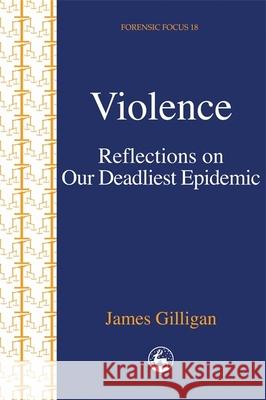Violence : Reflections on Our Deadliest Epidemic » książka
Violence : Reflections on Our Deadliest Epidemic
ISBN-13: 9781853028427 / Angielski / Miękka / 1999 / 320 str.
'James Gilligan has written a stunning book about violence. As a psychiatrist who has spent twenty-five years of his professional life treating men who committed murder, Gilligan draws poignantly on his work with prisoners to help us understand what motivates desperate men. In the end, he offers a compelling psychoanalytic explanation of violence while calling on society to take social, economic and cultural measures to help prevent the 'deadly epidemic' from spreading.' - Judith Friedlander, PhD., Dean of the Graduate Faculty of Political and Social Science, New School for Social Research 'Dr. Gilligan offers a personal and passionate summing up of his decades of empathic clinical work with men who have committed horrible crimes, and he succeeds in deepening our understanding of their inner lives, the dark world of prisons they inhabit, and the violence that pervades... society.' - Donald J. Cohen, M.D., Director, Yale Child Study Center 'Extraordinary. Gilligan's recommendations concerning what does work to prevent violence...are extremely convincing...A wise and careful, enormously instructive book.' - Owen Renik, M.D., editor, Psychoanalytic Quarterly 'Important and absorbing...a valuable book deserving a widespread and thoughtful readership.' - Norval Morris, Boston Globe, former Dean of University of Chicago Law School James Gilligan lays the foundation for a complete re-thinking of the nature and meaning of violence in society. He reveals the motives of men who commit horrifying crimes, men who not only kill other people, but also destroy themselves rather than suffer shame and loss of self-respect. He focuses on how feelings of shame cause violent and vengeful behaviour, and argues that conventional punitive legal and penal systems which are based on notions of justice and retribution perpetuate violent behaviour. He was called in to the Massachusetts prison system because of the high rates of suicides and murders within state prisons there; when he left these rates had dropped almost to zero. This keenly argued and ground-breaking book is essential reading for everyone touched by violence, and all those who are working to prevent it and its consequences











